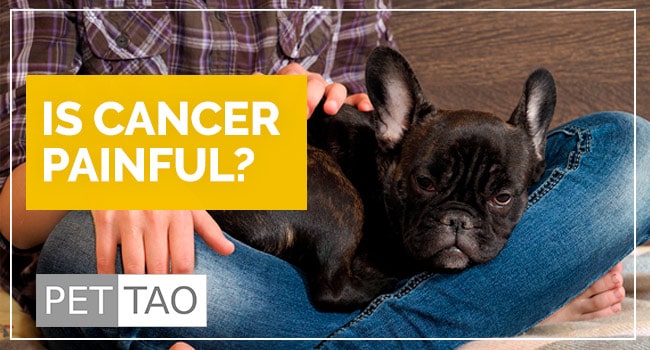Signs and Symptoms of Canine Cancer
Dogs get cancer just like people do.
Because cancer is so common in dogs, owners must be aware of the signs and symptoms of cancer.
If discovered early, many types of dog cancer can be effectively treated, allowing your dog to continue a healthy, happy life.
Our goal is to share information with you about the different dog cancer symptoms, dog cancer treatments, and different preventative measures readily available.
Attentive owners can spot dog cancer symptoms as soon as they appear and seek veterinary help immediately.
Often, early identification of cancer marks the difference between life and death.
If your dog experiences any of the symptoms described below, you should seek veterinary care as soon as possible.
Although these symptoms are not proof of cancer, all are possible signs of cancer. Remember, the earlier cancer is identified, the better.
Evidence of Pain
Evidence of pain or obvious limping while your dog is walking, running or playing is often a sign of arthritis, joint, or muscle issues in older dogs.
Signs of pain can also, however, be signs of bone cancer.
Changes in Bathroom Habits
Cancer can make a dog need to go to the bathroom more.
Other related signs of cancer are blood in the urine or stool.
If you notice any of these symptoms, contact your veterinarian immediately.
Lethargy or Depression
Cancer often makes dogs act more “lazy” all of a sudden. Not wanting to play or go on walks, or sleeping much more than usual can all be signs of cancer.
Coughing or Difficulty Breathing
Coughing and abnormal breathing can be caused by cancer as well as by heart disease and lung disease.
Cancer causes these symptoms when it metastasizes to the lungs.
Change in Appetite
Cancer can cause loss of appetite.
Oral, esophageal, and digestive tract tumors are the most common causes of appetite loss. The general malaise caused by cancer can also decrease the appetite in some dogs.
Weight Loss
Cancer is one of many things that can cause your dog to lose weight.
If you notice weight loss in combination with any other symptom on this list, definitely see your vet.
Non-Healing Wounds
Cancer, infection, and skin disease are all possible causes of non-healing wounds. Your pet should see your veterinarian for any non-healing wound.
Abnormal Discharges
Cancer causes a wide variety of abnormal discharges.
If your dog suffers from any type of abnormal discharge including pus, blood, vomiting or diarrhea, see your vet immediately.
Abnormal discharges accumulating inside your dog’s body can cause a distended or bloated abdomen.
Abnormal Odors
See your vet immediately if you notice foul or offensive odors emanating from your dog’s mouth, ears, or elsewhere.
Foul odors can be a sign of cancer or other chronic health issues.
Lumps and Bumps
Not all lumps and tumors are cancerous, but all should be checked by your vet.
Most vets perform a needle cytology to diagnose whether or not the abnormality is a cancerous tumor or a simple lipoma (fatty non-cancerous tumor) that will not cause harm.
As we explained earlier, the above list is not definitive proof of cancer.
But any one of these symptoms is a good reason for a trip to your veterinarian!
Owners also need to know that some forms of cancer are more lethal than other forms of cancer.
For example, dog skin cancer can easily be treated by surgery, but dog lymphoma and bone cancer (osteosarcoma) can metastasize through the body very quickly and cause death.
“The Dog Cancer Survival Guide” by Demian Dressler and Susan Ettinger is an excellent resource.
We keep a copy of this book in our clinic.
The Dog Cancer Survival Guide is full of helpful information and tips for helping your dog survive cancer.
Powerful Tools for Overcoming Dog Cancer
You might not be aware, but many cancer-fighting tools are easy to get and use at home.
To realize your true cancer-fighting potential:
- Learn more about dog cancer.
- Ease your dog’s discomfort naturally. PET | TAO’s Comfort is a blend of Eastern herbs and Western supplements to soothe your dog’s arthritic challenges to make him/her more comfortable.
- Boost your dog’s immune system with medicinal mushrooms. PET | TAO’s Complement Immune Mushroom Blend blends together the most powerful immune-boosting medicinal mushrooms on the market in a single product.
- Ease your dog’s stomach upset naturally. Many dogs with cancer suffer stomach upset as well. PET | TAO’s Harmonize GI naturally provides all the digestive enzymes and probiotics your dog needs for optimum gut health.
- Try PET | TAO Freeze Dried Beef Liver Treats. According to TCVM, liver controls tendons and ligaments. As few as 5-6 treats per day can make a huge difference in your dog’s tendon and ligament health!
- Try a Blood-building TCVM Diet. According to TCVM theory, dogs suffering from cancer also often suffer from Blood deficiency. Blood deficiency may due to chemotherapy the cancer itself. PET | TAO Zing dog food builds Blood.
- Learn more about TCVM Herbal Remedies. Chinese medicine offers many amazing natural solutions for dog cancer challenges and palliative care. Some good examples are:








